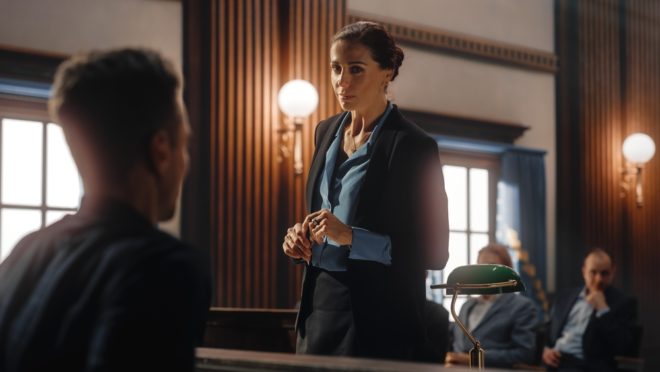

Call Attorney Marni Jo Snyder 24 Hours / 7 Days:
215.515.3360
In Pennsylvania, it is the judge who will determine the consequences you face, not the jury. A sentencing hearing happens after a guilty verdict at trial or when you enter a guilty plea. A guilty plea where the prosecution agrees to recommend the sentence that you want is called a “negotiated guilty plea.” A guilty plea where your lawyer is recommending one sentence and the prosecution is asking for another is often referred to as an “open guilty plea.”
When there is a chance of significant penalties in a case, or where the sentence recommendations are in dispute, there is generally a separate sentencing hearing. Once the jury enters a guilty verdict, the judge will dismiss the court and schedule this hearing. The judge may order a special department in the probation system to do a pre-sentence investigation. The investigator will talk to the defendant and even their family members about their background and plans for the future. They will pull school and employment records to verify the information.
During a sentencing hearing, the judge will follow these steps before determining the sentence:
Sentencing hearings are generally held in the same courtroom or at the same courthouse where the trial took place, or you made other appearances in your case. In addition to you and your counsel, the district attorney and their team will be present.
Your attorney may present an argument for a lesser sentence, offering character statements and information about your life. The district attorney’s office will likely try to show why you deserve a sentence that is much higher. The statutory maximums are determined by the grading of the charges for which the defendant was convicted. The judge will have the discretion to determine the penalties involved in your sentence.
However, they must follow the mandatory minimums, state guidelines, and other rules that apply to the crime the jury found you guilty of committing. The judge will consider the information available and use their experience and knowledge of the case to hand down a sentence.
For a free legal consultation, call 215.515.3360
According to the Pennsylvania Office of Victim Services, judges have many options to consider when they determine the sentence a person could face for a crime:
In most cases, judges use a combination of these penalties for serious crimes. For example, they may sentence the defendant to jail or prison, in addition to ordering them to pay fines and restitution.
Your specific sentence will depend significantly on the facts of your case, the crime you committed, and other considerations. Your attorney will have a good idea of the possible sentence you will face. Many cases also involve negotiating a sentencing agreement, so you may know in advance what penalties you will face.
The judge must consider many factors when calculating a sentence after a conviction in Pennsylvania. The information and testimony provided in the sentencing hearing will play a role. So will these considerations:
According to the Pennsylvania Committee on Sentencing, the sentencing guidelines set under commonwealth law offer a range of sentences that only consider:
These guidelines help the judge determine the minimum sentence. They can then use this minimum and any maximums set by the legislature to determine a proper range for jail or prison time in the case. They can also use the other information and evidence to shape the sentence they hand down.
In some cases, the best possible outcome a criminal defense attorney can provide is getting the judge to reduce your sentence. Convincing the court that you deserve leniency in sentencing is not always easy, especially if you have a criminal history and were convicted of a serious crime. However, your attorney will know the actions you can take to give you the best chance possible.
The character of the individual does matter when it comes to sentencing. Your attorney will know how to make you look your best to the judge and jury.
If your legal team believes your best option is a reduced sentence, they will begin sentence mitigation as soon as they go to work on your case. If possible, their efforts start before your arraignment or preliminary hearing. They may ask you to take these steps to put yourself in the best light for a better outcome in your case:
Your attorney will likely try to keep charges from being filed or have the case dismissed following the preliminary hearing. However, if neither is likely to happen, they may focus instead on mitigating the severity of the charges and reducing the sentence you might face.
One critical thing to remember about sentencing is that there is no one-size-fits-all answer. Instead, judges have many factors to consider, and there’s no telling which will be the one that matters to them.
In fact, your sentence could come down to which judge hears your case. Many times, two judges might offer dramatically different sentences for the same crime. Your lawyer will help you convince the one hearing your case that you deserve the most lenient sentence possible.
At the Law Offices of M.J. Snyder, LLC, we provide free consultations for those facing allegations of a serious crime in Pennsylvania. We can explain what to expect at a sentencing hearing, as well as how we would manage your case, build a strong defense, and represent your best interests. You can discuss your options with our team today.
Call 24/7: 215.515.3360
Email: info@snyderlawyer.com
Fax: 215-376-6981
This website is for general informational purposes only. The act of sending an e-mail to the Firm or any attorney at the Firm, or submitting a form response or other materials through the website, will not create an attorney-client relationship. The only way to create an attorney-client relationship with the Firm is through a written agreement.Read More